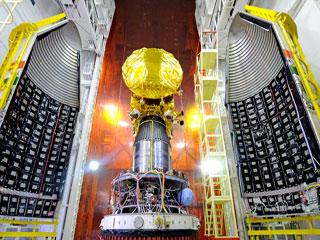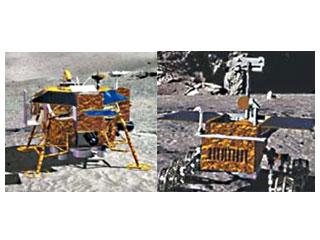
Mars Orbiter Mission Spacecraft attached to the 4th stage of PSLV-C25 and ready for heat shield closure. Photo: ISRO.
BANGALORE (PTI): Indian Space Research Organisation Chairman K Radhakrishnan does not believe the November 5 'desi' Mars Orbiter Mission (MOM) will fuel a space race with China which has not yet attempted such a venture to the red planet.
Radhakrishnan, Secretary in the Department of Space and Chairman of Space Commission, said each country -- whether it's India, the US, Russia or China -- had their own priorities.
"There is no race with anybody. If you look at anybody, they have their own direction. So, I don't find a place for race with somebody. But I would say we are always on race with ourselves to excel in areas that we have chalked out for ourselves," he told PTI here in an interview.
The MOM would be launched onboard PSLV C25 on November 5 from the Satish Dhawan Space Centre in the spaceport of Sriharikota.
Bangalore-headquartered ISRO, he said, is focused on space application, communication, remote sensing, navigation and space sciences and building satellites for those areas, besides indigenous launch vehicle technology.
If India succeeds in the MOM, it would be the fourth in the world, after the US, Russia and Europe to do so.
"China tried this, not exactly as a Mars mission of their own, they joined Russia and did a Probos-Grunt mission. That was in 2011 which had a problem; it did not leave the earth orbit. So, they (China) have not attempted as of now. But India will be the fourth country if we are able to succeed.
"That we can say in September 2014 (when the MOM spacecraft is planned to be inserted into Mars orbit). Being a complex mission of this nature, any day you advance it's a progress," Radhakrishnan said.
The ISRO chief rejected suggestions that heavier rocket GSLV could do a far better job vis-a-vis MOM than the PSLV, which would be used for the mission, and argued that GSLV development is not in conflict with the Mars odyssey venture.
GSLV with indigenous cryogenic engine failed in 2010 and ISRO had revisited the programme since then, with the first flight thereafter slated for December 15 this year.
There is a perception in some quarters that ISRO should have focused on getting GSLV operational again rather than venturing into MOM at this juncture but Radhakrishnan sought to debunk it.
According to him, the June 2011 feasibility study energised scientific groups to develop instruments for MOM. "We had 33 ideas. Only five instruments were flight-worthy. Others had their own technical issues.
"GSLV or any other vehicle that we had, we could not have put more than these five instruments. So, the presence of GSLV in that respect does not make any difference. GSLV would have put the satellite in a slightly higher apogee. With GSLV, one orbit-raising operation we could have avoided. Nothing more," he explained.
"These (GSLV and MOM) are two different streams of activity in the organisation," he said. "GSLV development has, I should say, no conflict with the MOM."
With MOM, Radhakrishnan said, India is developing technological capability to take a spacecraft to the Martian environment and then put it into an orbit.
 Previous Article
Previous Article Next Article
Next Article












The Indian Air Force, in its flight trials evaluation report submitted before the Defence Ministry l..
view articleAn insight into the Medium Multi-Role Combat Aircraft competition...
view articleSky enthusiasts can now spot the International Space Station (ISS) commanded by Indian-American astr..
view article